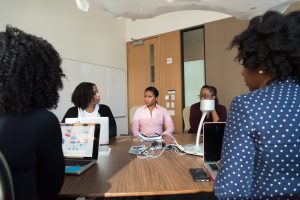
Key takeaways from ACCA Global recent webinar recognising Global Ethics Day 2020, 21 October
The Association of Chartered Certified Accountants (ACCA Global) recently held a panel discussion on Global Ethics Day, 21st October, exploring the pressing issues in the area of ‘Ethics and Sustainability – The Big conversation”.
We tuned in to hear insights from Jimmy Greer, Head of Sustainability at the ACCA, Marjella Alma, CEO and Co-Founder of Datamaran, Mark Miller, Deputy President of ACCA and Chris Quick, Director of Brand and Corporate Reputation of ACCA. They asked participants to decide on the topic of discussion and the majority deemed Climate Change, Corruption and Bribery and Economic inequality. Here’s our recap in case you missed the event.
Climate Change, Corruption, Bribery and Economic Inequality – Severe sustainability and Ethics issues.
Albeit, seemingly distinct issues Alma explains that the issue of Climate Change, Corruption, Bribery and Economic Inequality is actually connected. CEO of Datamaran , Marjella Alma shared ‘Climate Change affects Economic Inequality’. She urges senior leaders to be mindful that the success of their business hinges on people and the environment and so must recognize how their business affects the two factors.
‘Senior leaders are stepping up to this challenge and recognize that they need to address these issues.’
Which are the issues we can really contribute to due to the nature of our business?
What can have a financial impact on our business?
These questions were raised for businesses to reflect on during the discussion. Either way, several civil society stakeholders have taken up a position to hold these senior leaders accountable. From media to social media influencers, they all have a role in ensuring transparency within the private sector.
Mark Miller, Deputy President of the ACCA shifted the conversation towards discussing ethics and raised, ‘What planet are we going to inhabit in the future?’ He linked the issue of ethics into these pressing issues. He examined an accountant’s role in sustainability and ethical issues. Accountants are trusted advisors in the business community and must encourage the right decision. Decisions that act to mitigate the ramifications of climate change, corruption, bribery and economic inequality.
Jimmy Creer, Head of Sustainability at ACCA emphasized ‘’this profession can play a huge role in climate change’. Creer, stated that accountants ‘have the capacity to make a real impact and that members must be keen to take actions in their organization.’
Do you feel Businesses are committed to sustainable recovery after Covid-19?
The business community is divided into two groups. The first group are the ones pushing back explaining that more clarity is needed to make sustainable decisions. For this, CEO of Datamaran shared that “scepticism leads to inaction.’ The second group are the change-makers using their creativity to provide solutions.
“Business owners must switch from case studies to business transformation, transforming their business models to adapt.’ – Marjella Alma
Alma shared the massive shift in the public consciousness that has been occurring since COVID-19. Millennials are becoming the leaders of the world, bigger stakeholders are speaking loudly on these issues. Marjella also questions,
‘How consistent are corporate businesses making a difference? Can they talk about their specific actions?’ She also states that “there are technologies available to measure their commitment to sustainability’
Mark Miller added that “Self-interest is not the way we should be going, there is a wider world that we have a responsibility to’. He advises accountants to offer their insight and expertise to small and medium-sized businesses.
Jimmy Greer, Head of Accountability of ACCA, emphasized that they are committed to doing advocacy work. He explained that ‘ACCA members desire to see their organization do more to take on social issues and companies must transform to meet demands and make a social impact.’
Companies’ first reflex for survival is to focus on maximizing shareholder wealth but to facilitate the real change they need to shift their focus to their sustainability. Accountants must help the world towards that journey. The journey from self-interest to corporate interest and then public interest.
What can accountants do to create more ethical and sustainable businesses?
- Integrate sustainability into financial decision making.
- Apply tools that exist that tackle sustainability and ensure the necessary resources exist in teams to implement these decisions.
- Utilize the right internal controls that reflect the world that we live.
- Accountants can ensure the right execution- accountants will start to see the red flags and green flags in company disclosure in data collection and process.
- Regularize right governance procedure
- Ensure that positive action get rewarded
- Equip yourself with the technical skills on how to bring sustainability into decision making.
- Be conscious of the need to act ethically.
Mark Miller shared, Accountants can speak truth to power, the next eighteen months is critical for the profession, we need hearts and minds. While accountants bring about the necessary technical skills, advisory and persuasive skills may be more challenging.’
Accountants are reminded that as a profession there is a need to cultivate corporate social responsibility. There is a need to move from self-interest to corporate responsibility to community well-being.
Accountants were encouraged on the call to work in arms to solve social issues. Sustainability was regarded as an abstract concept until COVID-19 changed this perception. Sustainability is now more important than ever in redressing the effects of COVID-19. Environmental and social issues must be held in the same regard to financial issues.
Learn more about the event from ACCA here https://www.accaglobal.com/gb/en/news/2020/october/ACCA-Big-Conversation-Oct2020.html
https://www.youtube.com/watch?v=aonB3fgcL4I&feature=youtu.be
Author: Bernice Antoine





